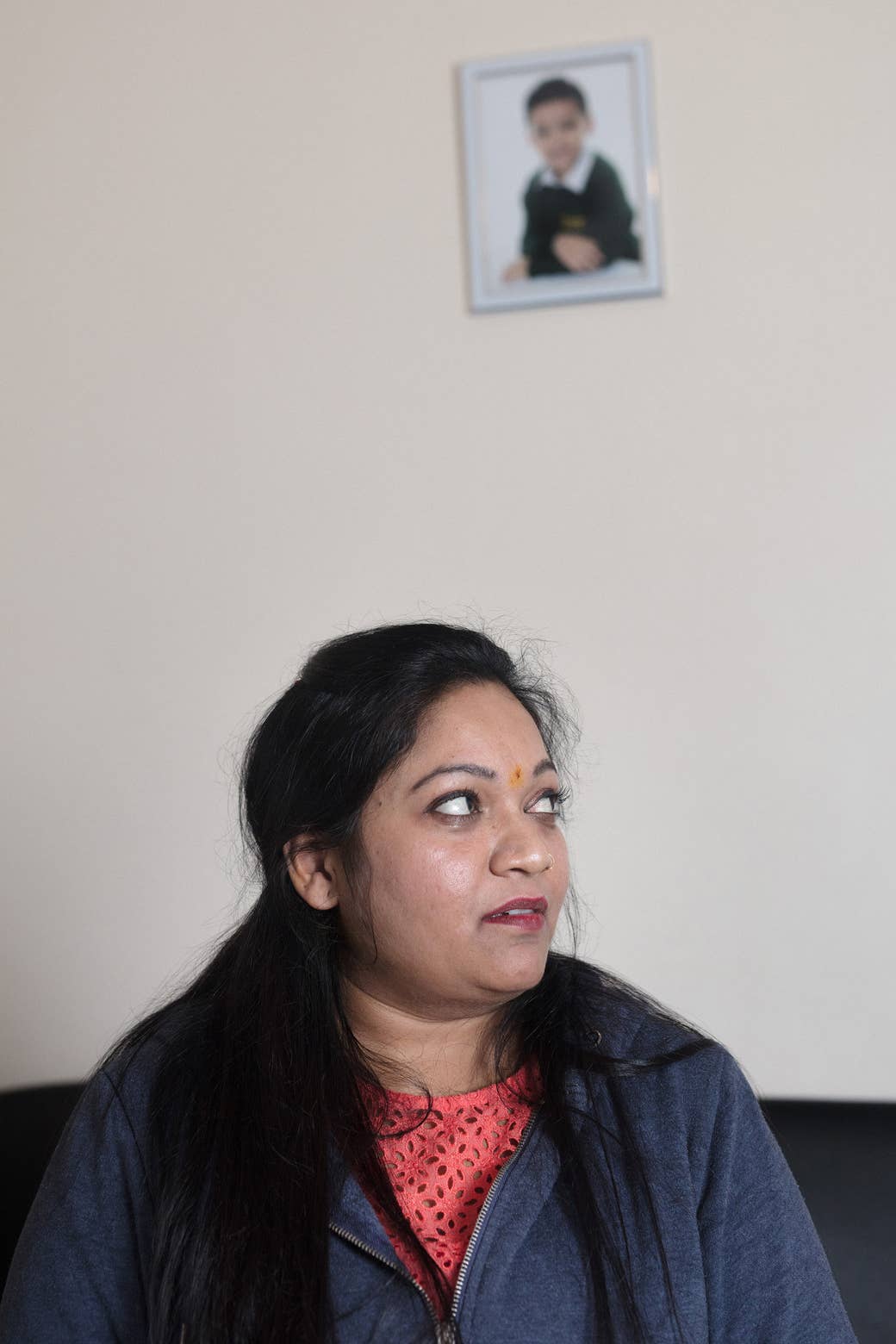Neelam was at home in High Wycombe, Buckinghamshire, when the call came that promised to change everything. She was being summoned for an interview for an executive job at a care home in Bournemouth. She had only a few months left on her post-study visa and this job was sponsored, meaning it came with a visa and represented a ticket to the future she wanted in Britain for her young family.
Shortly after the call, she rushed out to Primark to find an outfit to make a good impression, picking out a smart pair of black trousers and a shirt. Three days later she was in the glass atrium of a new office building in Borehamwood, Hertfordshire, with her husband and young son waiting outside, ready to make her case to the top recruitment agents who’d selected her. Two smartly dressed men calling themselves Jayesh and Harsh Patel led a detailed interview to check her suitability for the job and she felt it had gone well.
Days later when Amita Solutions, which billed itself as a high-end recruitment agency and immigration advice service in one, contacted her to say she had got the job, she was elated. “I thought my hard times had finished,” she told BuzzFeed News.
But instead, they were just beginning. Far from securing her future, she was about to fall victim to an elaborate scam that would wipe out her savings and leave her with no legal status in Britain. At least 40 other victims have come forward so far.

The Home Office — along with several immigration judges — has acknowledged that clients of Amita Solutions were victims of fraud. One Upper Tribunal judge remarked in a public judgment of one immigration case that “Amita Solutions defrauded the appellant and many others”.
Nobody has yet been brought to justice. Three men were arrested shortly after being reported to the police four years ago and were released under investigation.
According to former clients, Amita promised to find people top jobs with Tier 2 visas — visas pegged to specific skilled job offers. The service came at a premium, with fees of up to £8,000 to find the job and legal fees to process the wider family’s immigration application.
But in fact, the jobs did not exist. Amita invented vacancies at real companies with sponsorship licences. In Neelam’s case it was with a care home in Bournemouth called Acorn Lodge.
To make it realistic, Amita would fill out an actual Home Office certificate of sponsorship form online. In around two weeks, applicants would automatically receive a letter from the Home Office asking them to provide biometric details, making them feel their application was on track. Sometime after this, the postal address on the client’s Home Office account would be changed by Amita, so they could not learn that they had been rejected and be alerted to the fraud.
BuzzFeed News has tried to contact the Patels on the numbers provided to clients and through searching records, but has been unable to reach them. There were no numbers listed for the man named on the bank account that Neelam transferred money to, Mr Darji, and BuzzFeed News has not been able to find him via public records. It is not known to what extent, if any, the Patels and Mr Darji knew about the fraud.

It also appears the fraud may be ongoing in another guise. Acorn Lodge, where Neelam believed she was going to work but which had no knowledge that Amita Solutions was using its name for fake vacancies, told BuzzFeed News that it had had several calls a year since 2014 from people expecting to take up jobs there, and was still getting them this year.
These days Neelam, who spoke to BuzzFeed News on the condition that her surname would not be used, lives in a small terraced home in Walsall, near Birmingham, with her husband Kavinder and their two young sons. They relocated because they couldn’t afford the rent in High Wycombe and now rely on the charity of a nearby temple for meals.
Her family’s ordeal did not end there with the discovery of the fraud. Despite acknowledging that she and others were victims, the Home Office has failed to show leniency and grant visas outside the rules. Immigration tribunals have acknowledged the fraud, yet four years after it was reported to the Metropolitan police there is no evidence that the people who took her money and her chance of a working life in Britain are any closer to being brought to justice.
Neelam has been struggling to resolve her immigration status ever since the fiasco with Amita, and both she and Kavinder are barred from working, living off charity and handouts from already stretched relatives. Neelam has made several attempts to get status in Britain since discovering the fraud, and she has exhausted almost all avenues. After a new solicitor's firm that took on her case was closed before a judicial review could take place, the Home Office is supposed to be reconsidering her case and said it would come back to her in three months. It has already been more than three months.
Her oldest son, now 5, was born with a cloudy spot on his eye, had treatment at Great Ormond Street Hospital in London, and receives ongoing care. She made an application for a temporary visa based on compassionate factors, including her son’s care and the fact that the family were victims of fraud, but this was rejected.
The Home Office, immigration judges, the crime reporting centre Action Fraud, and the Met have all treated clients of Amita Solutions as victims of fraud. But none have been given the clemency of a temporary working visa to allow them to seek another sponsored job. Some have given up and gone home, while others are in limbo, fighting to prevent the prospect of a permanent scar on their immigration record.
Neelam and her family feel that, though they’ve played by the rules, the system has failed them. “The Home Office acknowledged that I was a victim of fraud but refused my application,” she said. “My husband and I are determined to fight as we lost our hard-earned money to the hands of fraudsters. It is heartbreaking to know that those fraudsters are not caught, despite making official complaints to the Metropolitan police, Action Fraud, and the Solicitors Regulation Authority. While I was asked to leave the country, those fraudsters roam freely.”
She added: “I haven't done anything wrong. If the Home Office could explain to me what is my mistake? Where am I wrong, then I’m ready. But what is my fault, I don't understand. They treat me like I’m a criminal. If I go back with the tag of illegal, how can I move to another country? My future is gone. There is no value of my master’s then.”
There are many others like Neelam, victims of Amita who are struggling to find another chance in Britain. Some are still fighting, while others have given up and gone home.
Louise Haigh, shadow minister for policing, told BuzzFeed News: “It is completely unacceptable that these victims have been re-victimised by the failure of the Home Office to provide them with any certainty. The police need to urgently progress this investigation and prosecute those who have shamelessly ripped off these people, and clearly a discretionary visa would be completely appropriate in the circumstances.”
In a case heard at the Field House Upper Tribunal in April 2018, judge Kekić accepted that a Nepalese couple with two young children were among several defrauded by Amita but sent their case back to the First-tier Tribunal, for legal failings in the previous judge’s ruling.
In her findings, she said: “It appears that at some point the appellant approached an organisation by the name of Amita Solutions which purported to be a recruitment agency as well as immigration advisers. He sought their assistance in finding providing employment and then in obtaining Tier 2 leave for him and an application under the points based scheme was made prior to the expiry of his leave. It then transpired that Amita Solutions defrauded the appellant and many others and that they had provided him with a false [sponsorship form].”
Sanika Walia, a solicitor at the Imperium Group, was crucial in uncovering the fraud and now has more than 40 clients who were victims of Amita. “It's a huge fraud and it’s had a huge impact on so many people,” Walia told BuzzFeed News. “I remember when the story first came to me I was horrified.”
It all began when a man came to her saying he had made an application for a Tier 2 visa using Amita and had not heard back about the job. When she looked up Amita, it was not registered with any regulator and the section to register a legal representative was blank in the Home Office form.
“After our meeting, the process he described did not quite make sense,” she said. “So as advised and then instructed we made our own inquiries with the Home Office. It is at this stage it was discovered that our client had been a victim of fraud.”
Walia advised him — and the other victims who came to her — to report the crimes to regulatory bodies and the police. “Many of our clients were too scared to report the matter,” she said. “Due to the deplorable nature of the crime our firm made contact with the police to assist with the reporting of the crime.”

Soon she was being inundated with requests for help. “As word of mouth spread our firm was instructed to represent more than 40 cases involving Amita Solutions using deception.”
But Walia is still waiting for justice for her clients. “From our understanding the Metropolitan police made arrests in the criminal case and evidence was being gathered for the prosecution,” she said. “Unfortunately, further information could not be disclosed by the police as the case is an ongoing criminal matter.
“This matter was reported to the police in late 2014. Our firm has worked very hard to assist all our clients in obtaining justice — however, it has been very challenging. We understand that the matter is still ongoing with the Metropolitan police and that the Home Office have dealt and are dealing with applications from people who have been victims of Amita Solutions.”
Walia is dismayed that the Home Office has not shown more clemency to the families affected. “Many clients were threatened with removal, and served decisions alleging that the clients themselves had used deception in making an application — an allegation that can have serious consequences for an applicant’s immigration status. Regretfully, the fact that client themselves had been victims and were assisting the police on various levels was not enough to secure further leave to remain in numerous cases. However, the Imperium Group was able to negotiate in court a declaration that recognised that the majority of our clients were victims. Given the uncompromising nature of the initial refusals, this was a big achievement.”
She is frustrated that the criminal case has not progressed faster. “I think they were arrested in late 2014 and still haven’t been charged. My understanding is they have masses of evidence, so I don’t know what the delay is,” she said.
“We hope that justice will be forthcoming and beyond this we cannot comment on the criminal aspect of the case. We do feel that victims assisting the police and the Home Office in any capacity should be recognised for their actions and difficulties that they have been through. Their actions contribute to maintenance of an effective immigration control and [that] is in the public interest. What form that recognition takes is, from our perspective, is that clients should be a granted leave to remain in the UK.”
BuzzFeed News asked the Metropolitan Police Service if it had any comment on accusations that it has taken an unreasonable amount of time to secure justice for the victims of Amita Solutions, given the fraud was first reported in 2014 and suspects were arrested shortly after.
The Met did not comment on this, nor on the fact that the case appears not to have been prioritised despite the devastating impact on families’ lives.
A spokesperson for the Met would not confirm the identities of those arrested but said: “Can confirm officers from Harrow are investigating an allegation of recruitment fraud alleged to have been committed in 2014.
“Three people aged between 25 to 31 have been arrested in connection with the investigation; all remain released under investigation.
“The investigation, which involves a number of other agencies, is ongoing and we will be not commenting further.”

Neelam and Kavinder came to Britain from Chandigarh, India, in September 2010 as newlyweds. Neelam had a place to begin a master’s in international business at Buckinghamshire New University and Kavinder had a visa as her dependent, allowing him to work at Domino’s Pizza as a manager.
They had been toying with moving elsewhere but felt Britain offered them the best future. “We had lots of options at that time,” Neelam recalled. “I did an English test. I had the option for Canada and New Zealand but we chose the UK because it’s the number one country. Good people, good English.”
Like many of her classmates on her master’s, Neelam dreamed of finding a sponsored job with a visa that could make her life in Britain permanent. When she finished her course in 2012 she had a two-year post-study visa and spent the time working in a care home, paying off student debts, saving for the future, and looking after her newborn son.
With just a few months left on her post-study visa, in early summer 2014 she began searching for recruitment agents who could find her a skilled job that came with a Tier 2 working visa.
At first she had no luck. All the organisations she contacted came back with nothing. Then an acquaintance in the year above told her about Amita Solutions. A recruitment consultancy and immigration service with a slick website, it seemed to be just what she was looking for.
After a quick phone call, they suggested she come in with her documents to see if she’d be eligible for work. They told her they had an in-house immigration adviser and could help with work permits. She put together all her immigration paperwork and education certificates and went to the company’s impressive building, a shared office space in Borehamwood with a high glass atrium and smart reception area. Neelam remembers being impressed, recalling “It was a very big, posh building.”
It was then she met Jayesh and Harsh Patel. “They introduced themselves as partners of Amita Solutions. While my family waited for me outside the office, they registered me and told me that they will call me if they find a suitable vacancy for me. They also gave me their company business card.”

It seemed that her hard work had paid off and she was taking her first step into the corporate world. At that first meeting, she said, they explained that if they found her a job she would have to pay fees for their immigration and legal advice, as they would be securing visas for the whole family. The job they called her to interview for, working as a sales, accounts, and business development manager at the care home in Bournemouth, seemed an ideal combination of her education and work experience.
Later, at the job interview, the questions were so similar to one she had for her current job working in a care home that she still suspected nothing. “They were asking questions relating to my job. They asked, ‘How do you handle old people? What are you doing there?’ I said, ‘Helping people with dementia.’ They said, ‘OK, if it’s dementia, what will you do if the old people had a fall?’ and I said ‘I’d call my manager.’ These are the type of questions he asked me. I was happy. It looked like a real interview, because my manager asked me the same questions [for my old job]. So I thought, yeah, I’ll definitely get the job and I’ll start my proper work.”
When, several days later, she got confirmation that she had made it through the selection process, she was elated. “I thought my hard times had finished and I’m going to start my work and we’re going to get a better life. But this is the worst life. Now I’m thinking that student life was the good life for me.”
The couple were ready to relocate to the south coast for the job and went in for one further meeting to sort out the immigration paperwork.
Neelam says Amita filled out the official Home Office certificate of sponsorship (COS) form online and sent her a copy, seen by BuzzFeed News. Everything appeared aboveboard, right down to the reference numbers and addresses of her new employer.
Once the job appeared to be secured, Neelam transferred the first £3,500 payment for Amita’s services to a bank account in the name of Mr Darji, and then, two weeks later, the next instalment. The money represented all of the family’s savings, carefully put aside over thousands of hours of shifts caring for older people and managing pizza deliveries. But it felt worth it to secure their future.
Because a genuine application to the Home Office was made, albeit one that it would later transpire involved a fake job, everything seemed to be progressing normally at first. “When my application was submitted, within 15 days we got the biometrics from the Home Office, so I thought that, yes, we’re on the right track,” Neelam said.
Then suddenly there were no more letters. It later transpired, in common with other Amita cases, that someone had logged in and changed the address on the application to redirect all future correspondence somewhere else so that no news would arrive of the application’s failure.

“I don’t know when they changed the address. Maybe they know that within 15 days they will get the biometric letter,” Neelam said.
As a month went by with no news from the Home Office or her new employer, Neelam’s suspicion grew. She had been told her visa would come through within a month and had been given a July start date in the new job when she attended the interview in June. “So I called them [the Patels] and at first they didn’t pick up the call, and then the next day they picked up the call and they said, ‘We’re in Gujarat for a trip and we will come back after one month.’
“He was saying that to everyone. So everyone waited for one month and then he stopped picking up the calls. He didn’t answer anyone.”
At that point, she and a friend who had also been caught up in the same scam decided to go back to the office in Borehamwood and found no trace of the two men. “The receptionist said, ‘They’re not here anymore.’ We explained everything to her and she said, ‘We can’t help you — you have to complain to the police and then they can help you.’”
They found another address on the firm’s website (which has long since been expunged from the internet) and went to see if they could find them. It was a house under construction and when the builders called the owner, Neelam recalls he said: “No, I’m a very old man. I don’t have this kind of business.”
The Patels had stopped answering all calls and Neelam was nervous. She found a new solicitor, Sanika Walia, who put in a call to the Home Office. Walia discovered that, like several other clients, Neelam’s address had been changed, but the Home Office had yet to make a decision. She alerted the department to the fraud and Neelam made formal reports to Action Fraud, the police, and the Solicitors Regulation Authority.
Still half-hoping that a job existed, Neelam put in a call to the Acorn Lodge care home where, until recently, she thought she was about to start work. They had no idea who she was. “I called them and they said no, they don’t know about me. I gave my COS number and they said no, this was for someone else working there before.”
BuzzFeed News spoke to a manager at Acorn Lodge, who explained that Neelam was not the only caller and that she had no idea about the job offers the company was supposed to have made until the phone calls started coming in. “The first thing we ever know about it is a phone call from someone distraught and upset,” she said. “They’re ringing to say ‘When’s my start date?’ They’ve borrowed money from family members and everything else to get here.”
The manager, who did not want to be named, said: “It still goes on now. It’s a few times a year. People will say, ‘You’ve made me a job offer, you’re this, you’re that’ and I make it plain that, yes, I have a sponsor licence but I’ve not made any job offers, I don’t know you. I’m sorry about your predicament but you need to report it.
“People get cross and very upset. They talk about their families and this and that, but I just have to be honest. I empathise with them. These people are trying to come to the country in a legitimate and honest way and they’re vulnerable, but unfortunately in all walks of life there are always sharks.”
Acorn Lodge is not the only company getting calls as a result of Amita. BuzzFeed News has seen a judgment where the supposed job was at a luxury clothing retailer, and there are understood to be many others.
Neelam knows that she lacked an understanding of the way things work in Britain — for example, that in most cases charging for recruitment services is illegal. “We didn’t have much knowledge of how things work in the UK. We didn’t know anything, we just trusted them,” she said.
The Home Office was asked about its handling of victims of Amita. A spokesperson said: “We are aware of cases in which individuals have been defrauded out of large sums of money and given incorrect immigration advice.
“Where these cases have been brought to our attention through legal proceedings we have offered unsuccessful applicants the opportunity to submit new applications for leave to remain. Where necessary we have amended the reasons for refusal so as not to prejudice future applications.”
But as Neelam continues to wait for a decision, following repeated rejections from the Home Office, she is still frightened of the impact of the scam on her future. “If I go back and apply from India to another country they will definitely refuse my application if I’ve got a refusal on my passport, because they will check everything. I want a good history from the UK and then I’m ready to move, but at the moment I want justice.”
At the family home in Walsall, Neelam’s oldest son runs in and out of the room in neat school uniform. She is worried about the upheaval of moving when he has only lived in Britain. “He loves his school. He’s enjoying it and never wants to miss it. Even when he’s not well he wants to go to school. He’s very good at his studies and getting lots of certificates.”
Her husband Kavinder picks up their youngest son, who is beginning to cry. As he bounces him on his hip, Kavinder makes a final plea for the family: “We came here for good life and we did everything we were supposed to. We need justice.”
